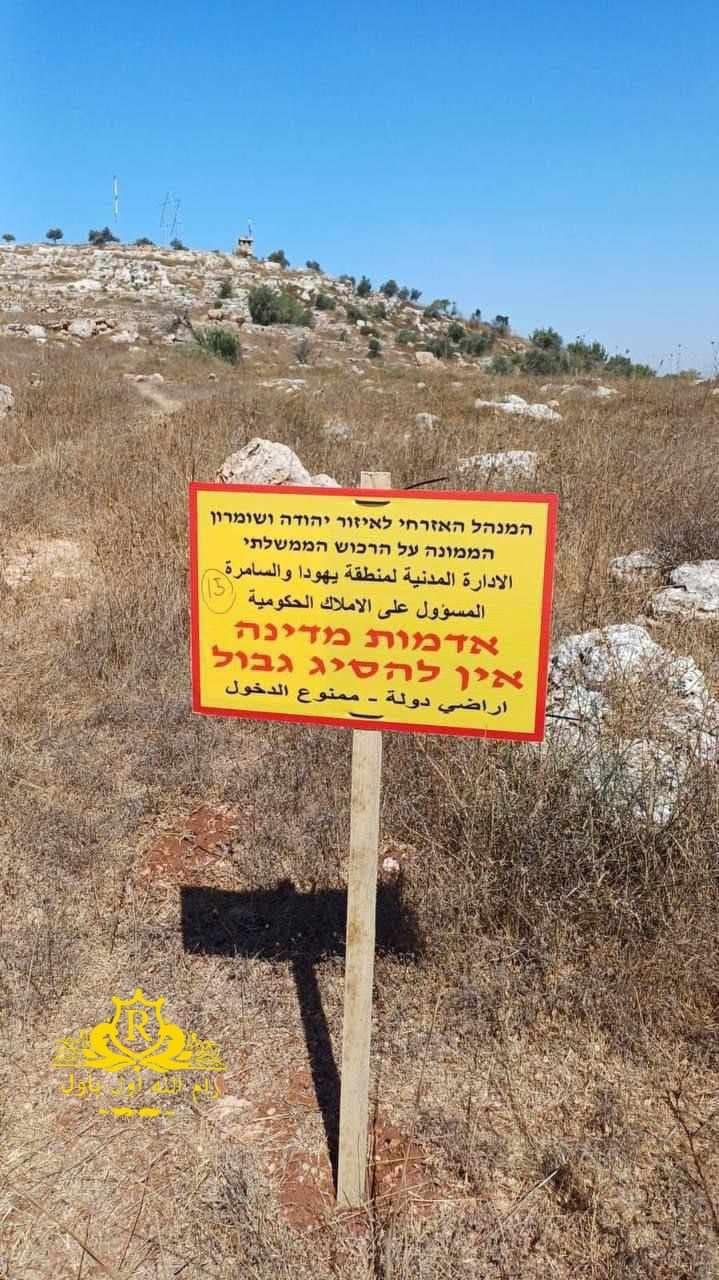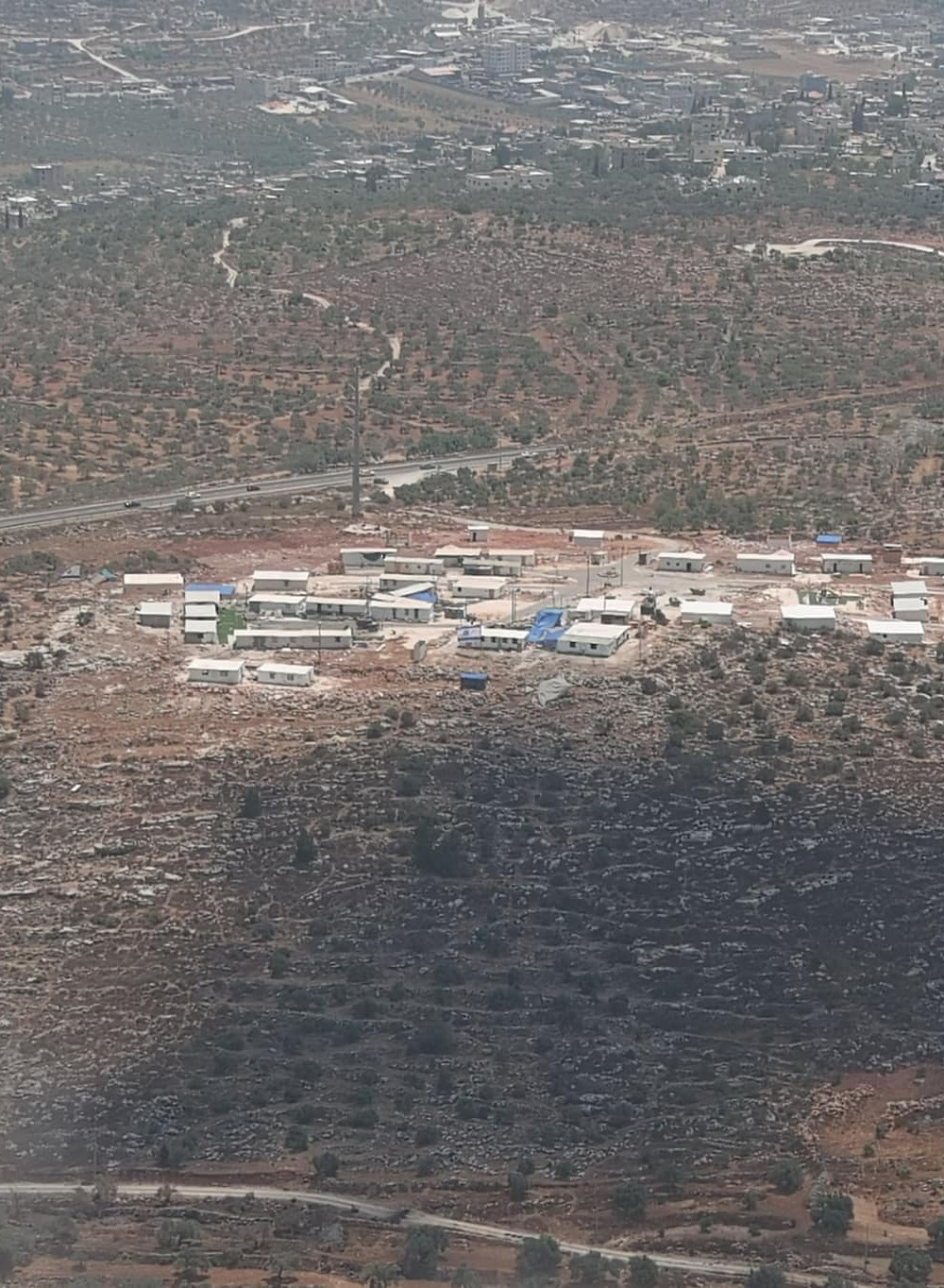2024-07-09
Israeli Occupation Declares "Jabal Sabih" Area as "State Land" in Beita Town / Nablus Governorate
- Violation: Declaration of dozens of dunums as state land via signage
- Location: Beita Town – Jabal Sabih / Nablus Governorate
- Date of Violation: July 2024
- Perpetrator: So-called Israeli Government Land Authority - Civil Administration
- Affected Party: Residents of Beita Town
Description:
In line with the accelerating pace of settlement activity in the West Bank, the so-called Government Land Authority of the Israeli Civil Administration announced in early July 2024 that the land on which the "Eviatar" settlement is established on Jabal Sabih hills south of Beita Town has been declared government property, meaning it has been confiscated and placed under occupation authorities’ control.
This announcement comes despite a petition filed by the Palestinian landowners to the Israeli Supreme Court challenging the legality of the agreement between the occupation government and the settlers residing in the outpost. The agreement stipulates that settlers will temporarily leave the area while keeping the buildings intact and preventing landowners from accessing their land until the so-called Israeli Civil Administration completes the process of declaring it "state land," in preparation for the return of the settlers to the outpost.
The settlement outpost on Jabal Sabih
The area affected by this move is estimated to be around 90 dunums, where settlers' homes and mobile settlement units, both occupied and vacant, are currently located, awaiting the return of settlers.
This procedure represents a new method to circumvent Palestinian agricultural land to expedite settlement expansion and isolate Palestinian villages and communities from one another. The initial establishment of the "Eviatar" settlement began in 2021 when a group of settlers established an outpost on the Jabal Sabih hills. The number of these units has since increased to over 25 mobile homes. However, due to pressure from Palestinians aimed at forcing the settlers to leave the area, the Israeli Civil Administration temporarily evacuated the settlers in 2022, intending to convert the land into state land and then return it to the settlers temporarily.
The "Eviatar" outpost poses a significant threat as it serves as a link between the "Ariel" settlement and the Green Line to the west and the Jordan Valley settlements. This will facilitate the creation of a continuous settlement strip separating northern West Bank from the central region.
In the coming days, it is expected that dozens of settlers will return to the outpost, which will have severe negative repercussions for farmers and landowners in the vicinity, most of whom have olive groves.
Legal Commentary:
State Land: This refers to land owned by the occupation state treasury, which has been confiscated from its original owners under certain laws serving its interests. The land is then allocated to settlers for settlement, pastoral, and agricultural activities. On the hills south of Hebron, you can see outposts with sheds, tents, and sheep farms, as well as land that has been rehabilitated and planted with trees, particularly grapes, which are now widespread in this area.
The process of confiscating and seizing Palestinian land is a clear and blatant violation of international agreements related to land and natural resource violations. Article 1 of the International Covenant on Civil and Political Rights states: "All peoples may, for their own ends, freely dispose of their natural wealth and resources without prejudice to any obligations arising out of international economic cooperation, based on the principle of mutual benefit, and international law. In no case may a people be deprived of its own means of subsistence."
Additionally, Article 17 of the Universal Declaration of Human Rights, 1948, states:
- "Everyone has the right to own property alone as well as in association with others."
- "No one shall be arbitrarily deprived of his property."
مشروع: حماية الحقوق البيئية الفلسطينية في مناطق "ج" SPERAC IV - FCDO
Disclaimer: The views and opinions expressed in this report are those of Land Research Center and do not necessarily reflect the views or positions of the project donor; the Norwegian Refugee Council.
إخلاء المسؤولية: الآراء ووجهات النظر الواردة في هذا التقرير هي آراء ووجهات نظر مركز أبحاث الأراضي ولا تعكس بالضرورة وجهات نظر أو مواقف الجهة المانحة للمشروع؛ المجلس النرويجي. للاجئين


